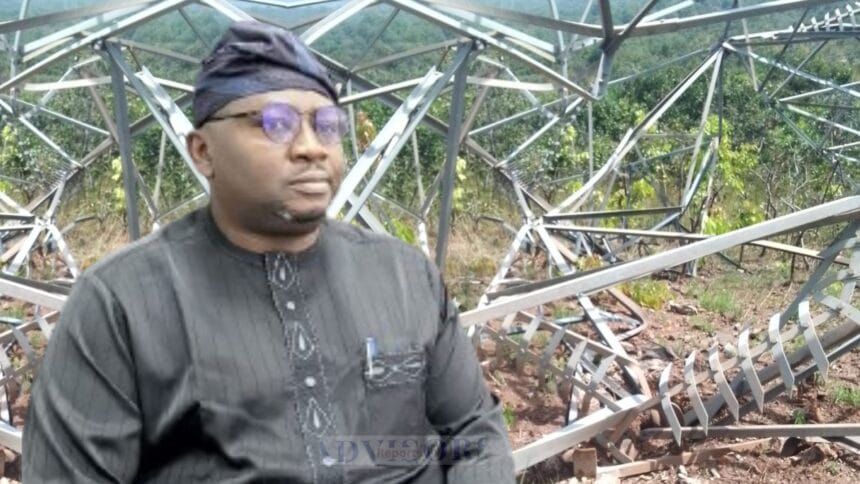… says Northern DisCos remit just 30% in Q4/24, Abuja DisCo covers 85% of payment
… Eko, Ikeja DisCos power Southern remittance with 70% share
Oredola Adeola
Chief Adebayo Adelabu, Minister of Power, has blamed DisCos for failing to meet performance targets and urged the National Assembly to pass stricter laws to hold them accountable, warning that their inefficiencies threaten the 6,003MW output recorded in March 2025 and other recent gains in the power sector.
Adelabu, who made the call at the weekend during a two-day retreat organized by the Senate Committee on Power, lamented that the DisCos have continued to frustrate consumers despite improvements in electricity generation.
“We need to get tough with the DisCos, as they can easily frustrate all the gains we have made. They have disappointed us in performance expectations.
“Whatever we do in generation does not mean anything to consumers if it is frustrated at the distribution points,” the Minister said.
He decried the state of the DisCos’ operations, citing aging infrastructure, rampant electricity theft, poor investment, and deepening reliance on unsustainable subsidies as factors that have left millions of Nigerians in darkness.
Adelabu also reflected on the 2013 restructuring of the power sector, noting that the DisCos were expected to have technical partners.
He said, “A lot of them showed partnership with foreign companies for that purpose, which lasted for about three months.
“Immediately they took over, those companies left. So, we need utility companies that can invest in the sector to improve infrastructure and service,” he said.
Chief Adelabu also revealed that rather than investing in infrastructure, many of the companies took loans from banks to acquire the assets and are now diverting revenue to repay those loans.
“Despite recent tariff adjustments that boosted market liquidity by 70 percent—raising sector revenue from ₦1 trillion in 2023 to ₦1.7 trillion in 2024—the distribution segment, according to the Minister, remains the weakest link in the electricity value chain.
“In the fourth quarter of 2024, DisCos in the North remitted just ₦124.4 billion, representing 30 percent of their ₦408.86 billion invoice.
“Abuja DisCo alone accounted for 85 percent of the Northern payments.
“Southern DisCos fared slightly better, remitting ₦254.6 billion, or 67 percent, though 70 percent of this came from Lagos DisCos alone,” he stated.
The Minister of Power therefore attributed that regional discrepancies to crumbling infrastructure outside economic hubs, where underinvestment has left distribution networks dilapidated.
Adelabu emphasised that the power sector is currently weighed down by a staggering ₦4 trillion subsidy backlog owed to generation companies, including ₦1.94 trillion accrued in 2024 alone.
He disclosed that monthly shortfalls now exceed ₦200 billion, warning that sustaining current electricity tariffs is becoming “unsustainable” and continues to strain government finances earmarked for critical infrastructure investments.
“To salvage the sector, we will soon embark on restructuring underperforming DisCos and tightening enforcement of performance benchmarks,” the Minister said.
“But without urgent capital injection into distribution networks, the recent gains in generation—including a historic 6,003MW output in March 2025—and improvements in transmission, such as the deployment of 61 new transformers in 2024, will not translate to stable and reliable household supply.”
Speaking on the metering gap, Adelabu noted that as a key driver of revenue loss and consumer distrust, the gap underscores systemic neglect.
He added that the government has launched a ₦700 billion Presidential Metering Initiative (PMI) and a World Bank-backed program targeting 4.3 million meters by 2025.
He noted that 75,000 units were deployed in April 2024 while additional 200, 000 is expected in May.
“Closing this gap is fundamental to fair billing and financial sustainability,” the Minister acknowledged, “but we are not there yet due to underinvestment and operational inefficiencies.”
Adelabu also announced plans to attract more private investment into grid infrastructure and to regionalize the transmission network in a bid to minimize systemic failures.
He further linked the 70 percent remittance by the two Lagos-based DisCos to the relative strength of infrastructure in the South compared to the North, where many utilities remain weak.
“The Lagos DisCos’ performance shows what is possible when infrastructure is functional. It’s a stark contrast to the Northern networks, where poor infrastructure severely hampers revenue collection and service delivery,” he said.
The Minister of Power, Chief Adebayo Adelabu, has appealed to the National Assembly to enact stronger legislation aimed at protecting Nigeria’s power infrastructure from persistent acts of vandalism, sabotage, and theft.
Speaking on the sector’s recurring challenges, Adelabu emphasized that the destruction of critical energy assets must no longer be treated as civil offences but as criminal acts with severe consequences. “We need more stringent legislation to tackle this problem,” he said, calling for enhanced legal backing and public vigilance to safeguard “national assets that belong to every Nigerian.”
Adelabu listed power theft, illegal connections, and non-payment of bills by consumers as core challenges hampering the efficiency and financial sustainability of the electricity sector. He revealed that, despite these issues, the national grid has maintained stability with no recorded collapse since the start of 2025—an achievement he credited to ongoing investments and operational improvements.
“The level of grid stability we see today is not by accident—it’s a result of hard work and massive expenditure.
“In 2024, the Transmission Company of Nigeria (TCN) installed 61 new transformers, and in the first four months of 2025 alone, 13 more high-capacity units have been added, ranging from 10MW to 300MW,” Adelabu said.
However, he decried the recurring vandalism of these high-value assets. “Our towers are being toppled by saboteurs. People tamper with meters and make illegal connections, even as we spend hundreds of millions of dollars installing infrastructure meant to improve lives,” he stated.
The Minister also highlighted the dire financial situation of TCN, which, he said, is struggling to operate solely on its Internally Generated Revenue (IGR). “TCN is critically underfunded. Their IGR has been declining, and what they earn monthly cannot even pay staff salaries, let alone maintain or expand transmission lines. We need to find a way to include TCN in government budgetary appropriations,” he urged.
Adelabu reiterated that the sector’s biggest constraint remains the chronic underinvestment in distribution infrastructure.
He noted wide disparities in the performance of Distribution Companies (DisCos), particularly between those in Lagos and the Northern region, where poor infrastructure and electricity theft have deepened reliance on subsidies, leaving millions without reliable power.
To address these regional disparities, the Minister outlined plans to boost power supply in Northern Nigeria.
He disclosed that the Federal Government is reviving the long-abandoned 215MW Kaduna Thermal Power Plant, which is currently 87% complete. “Efforts are ongoing to restore this critical plant,” he confirmed.
He also revealed plans for the development of the 1,000MW Makurdi Hydropower Project and the concessioning of the 10MW Katsina Wind Farm, which has been idle for years.
“The Katsina State Government has expressed interest in taking over the wind farm alongside private investors. A feasibility study is already underway,” Adelabu said.




